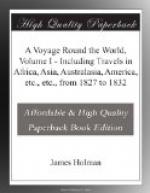Monday, Nov. 19.—The young man, named Matthew Elwood, who had so recently returned from his visit in the interior, where he had been sent by Capt. Owen, with a view of acquiring some knowledge of their language, volunteered to repeat it, accompanied by another young man, and they had now been two days at the same village a few miles distant from the settlement, where the King resided. Anxious to lose no opportunity of obtaining information respecting the manners and customs of this singular people, I determined on joining the party, and fixed upon the present day for my journey. I have ever, throughout life, but perhaps more particularly since the loss of my sight, felt an intense interest in entering into association with human nature, and observing human character in its more primitive forms: this propensity I have previously had opportunities of enjoying, in some of the countries most remote from European knowledge, amidst the wilds of Tartary and the deserts of Siberia; and I can refer to the indulgence of it many of my more pleasurable sensations. I know that the world declaims against the absurdity of an individual, circumstanced like myself, professing to derive either pleasure or information from such sources, and maintains that travelling by the fireside would better suit those circumstances, and convey an equally gratifying interest. I answer confidently that this is not the case, and that I believe the intensity of my enjoyments under the system I have adopted, equals, if not surpasses, what other travellers experience who journey with their eyes open. It is true, I ascertain nothing visibly; but, thank God! I possess most exquisitely the other senses, which it has pleased Providence to leave me endowed with; and I have reason to believe that my deficiency of sight is to a considerable degree compensated, by a greater abundance of the power of imagination which presents me with facility to form ideal pictures from the description of others, which, as far as my experience goes, I have reason to believe constitute fair and correct representations of the objects they were originally derived from. It must be recollected that I have formerly enjoyed the power of vision; and, although my colourings may occasionally be too weak or too vivid, it is fair to infer that the recollections of my former experience are sufficient to prevent me from running into gross inaccuracies or incongruities. Place me, as some have suggested, in the situation of the man in the farce, and carry me in a limited circle around the same point, under the assurance that I was travelling to distant and ever-changing scenes, and support the stratagem by every circumstance calculated to give it the fullest effect; it would never impose upon me: for the tact which nature and experience have given me, and the inconceivable acuteness of perception I derive from it, would immediately detect inconsistencies scarcely appreciable by others, and at once overturn and expose the deception which was being practised.




